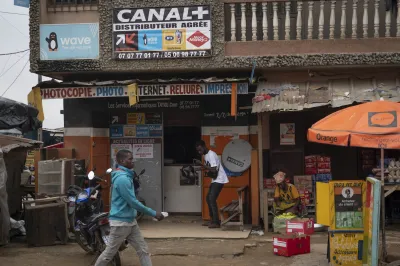Better Regulations Can Spur Agent Banking in WAEMU
The West African Economic and Monetary Union (WAEMU) has taken significant steps toward financial inclusion in recent years. Mobile money has driven much of this progress under the aegis of regulations that make it possible for mobile network operators to offer e-money services and expand their agent networks and the reach of their services. However, WAEMU’s regulations make it difficult for banks and microfinance institutions to expand their own agent networks and contribute fully to financial inclusion. While the number of mobile money accounts and agents in the region roughly doubled between 2014 and 2017 (to 36.4 million and 183,000, respectively), banks and microfinance institutions have lagged behind.

Even in the age of mobile money, these traditional financial institutions have an important role to play in expanding low-income customers’ access to financial services. For example, as Will Cook points out in his recent CGAP blog post, bank accounts in Kenya once again out number mobile money accounts – by 30 percent. Alongside partnerships with mobile money providers, a rise in agent banking has contributed to this increase. In 2016, 17 commercial banks developed agent banking and contracted over 40,000 agents. The Central Bank reported that agent banking saw 55.8 million transactions in the first quarter of that year, compared to 10.3 million in the same period the year before. Kenya’s regulators enabled this kind of growth by adopting a risk-based approach when defining the country’s agency banking regulatory framework in 2010 and integrating provisions for consumer protection.
What will it take for WAEMU regulators to similarly unlock the potential of banks and microfinance institutions to drive financial inclusion for the region’s 50 million people living in poverty?
This month CGAP published a regulatory diagnostic of digital financial services in Côte d’Ivoire, which has the same agent regulations as the other WAEMU member countries (Benin, Burkina Faso, Guinea-Bissau, Mali, Niger, Senegal and Togo). We found that WAEMU recognizes three types of agents and that the regulations surrounding them contribute to disparities among different types of institutions (banks, nonbank e-money issuers, microfinance institutions, etc.):
E-money agents. E-money agents may conduct marketing activities and supply services related to e-money, including account enrollment, cash-in and cash-out and payments. Current regulations provide for a two-tier system of primary agents and subagents (or “distributors” and “subdistributors,” as they are called in the regulation), who act under the responsibility of the e-money issuer. Retailers and other registered businesses, microfinance institutions, the post office and other nonbank financial institutions are permitted to serve as primary agents. These agents may outsource to other registered businesses who act as subagents. These rules have allowed mobile network operators to deploy large agent networks in the eight WAEMU countries.
Rapid money transfer agents. Another regulation enables banks, nonbank financial institutions and microfinance institutions to provide over-the-counter transactions, or “rapid fund transfers,” through retail agents called “subagents.” Permitted transactions are limited to real-time transfers that are performed over the counter at an authorized provider or agent and do not involve any bank or e-money account of either the sender or recipient. These providers act under the responsibility of a financial institution and are not allowed to collect funds for deposits for any purpose other than over-the-counter transfers (unless they are microfinance institutions). The best-known of these over-the-counter providers is WARI, which has large networks of subagents in most of the WAEMU countries.
Banking agents. Beyond e-money and over-the-counter transfers, the scope for using agents is unclear. The rules that do exist are highly restrictive for banks, and there is no explicit framework for microfinance institutions. Banks are authorized by the banking law and a 2010 instruction from BCEAO (the common central bank for the WAEMU region) to use agents called Intermédiaires en Opérations de Banque (IOBs). An IOB acts under a mandate assigned by a bank, which may include opening accounts and taking deposits. Each IOB is required to obtain approval from the Ministry of Finance, on the advice of BCEAO. It is also subject to fit-and-proper standards – a financial guarantee whose level depends on the nature of the mandate and regular reporting requirements. The IOB model did not arise for the sake of financial inclusion but rather, as a business niche for intermediaries operating within the traditional banking sector comparable to an insurance agency. As a result, since the introduction of these rules in 2010, BCEAO has approved and registered only six IOBs, and two are authorized to just collect deposits.
While regulations on e-money agents have greatly expanded the reach of mobile money, those surrounding agent banking appear too restrictive for the banks and are nonexistent for the microfinance sector. This creates a competitive disadvantage for traditional financial services providers to make use of digital channels in expanding their reach and relevance. Uniform, or at least harmonized, rules across the board for e-money, over-the-counter transactions and banking agents would be a big step in the right direction. Any new framework should provide a comprehensive and proportionate set of risk-based rules on due diligence, supervision, internal control and subagents. And special consideration should be given to replacing or revising IOB rules to support a more flexible agent banking approach.
More harmonized rules around agent networks would ensure a level playing field for all financial services providers to seize the opportunities presented by digitization to reduce cost, increase scale and expand financial inclusion.




Add new comment